Review for Fullmetal Alchemist: Brotherhood - Part 1 (2 Discs)
Introduction
I’ve finished so I’ll start? Cause and effect may apply to fiendish TV quiz shows, but it doesn’t apply to reviewing anime, as I take a look at Fullmetal Alchemist Brotherhood Part 1 on Blu-ray. This was one of the first major shows for Manga Entertainment to be released on DVD and Blu-ray a few years ago, but when it came time for me to review it, I had to review the DVDs for simple reason of not having bought a Blu-ray player yet. I wasn’t alone, as it turns out that the first two volumes of Brotherhood on Blu-ray bombed for Manga, and they went and cancelled the series. Of course the march of technology is inevitable, and it wasn’t long before I was HD ready and off the marks reviewing anime on Blu-ray. I still caught the hind end of Manga’s teething troubles with the technology with more cancellations to come, but this last year, the fandom had started catching up in terms of ownership of players, while the cost of manufacturing discs had finally come down to a reasonable level for smaller distributors. This year, Manga finally completed the Fullmetal Alchemist Brotherhood Series on Blu-ray, and as usual they sent me the check discs to review. I finally got to see what all the fuss was about, and it turns out to be quite worth it. Brotherhood on BD blows Brotherhood on DVD out of the water. In terms of video and audio, it is spectacular, one of the better anime Blu-ray releases around. My mind was made up with volume 3, but once bitten, twice shy and all that, I waited until the volume 5 check discs were on my doormat before I placed the order for volumes 1 and 2 on Blu-ray.
Once again, this review cuts and pastes liberally from the DVD review. That material is in italics.
Alchemy is the art of the transmutation of matter by means of an incantation, a mystical circle, or sheer willpower alone. For centuries charlatans and the deluded pursued the creation of gold by alchemical means but to no avail. But in Full Metal Alchemist, alchemy is a realised science. Set in an alternative world during the early years of the twentieth century, the transmutation of elements is indeed a reality, and the state regards such talent highly indeed. Full Metal Alchemist tells the story of brothers Edward and Alphonse Elric, two precocious alchemists who are on a quest. The young brothers had attempted the unspeakable, resurrecting their mother. But the Law Of Equivalent Exchange cannot be flouted, only objects of equal mass can be transmuted, and the dead cannot be brought back to life. The attempt failed disastrously. Now, Alphonse is a disembodied spirit bound to a suit of animated armour, while Edward has replaced his leg and arm with metal automail, but it’s his prodigious facility with alchemy that has earned him the name, Fullmetal Alchemist. Now they search for a means to restore their bodies.
This first collection of Fullmetal Alchemist Brotherhood comes with 13 episodes across 2 discs from Manga Entertainment. Owners of the first series should be aware that most of this first collection would be repetition for them. In essence with a few significant differences, these thirteen episodes, with a lot of judicious edits and restructures and omissions, retell the story from the first half of the first series. Twenty-six into thirteen does go, if you push it.
Disc 1
1. Fullmetal Alchemist
2. The First Day
3. City of Heresy
4. An Alchemist’s Anguish
5. Rain of Sorrows
6. Road of Hope
7. Hidden Truths
8. The Fifth Laboratory
9. Created Feelings
Disc 2
10. Separate Destinations
11. Miracle at Rush Valley
12. One is All, All is One
13. Beasts of Dublith
Picture
Fullmetal Alchemist Brotherhood gets a 1.78:1 widescreen transfer at 1080p resolution. I got pretty technical about it in my review for the volume 3 Blu-ray, so I won’t repeat that here. Suffice it to say that while it may have been animated at less than 1080 lines of resolution and up-scaled for the HD broadcasts and these Blu-rays, Brotherhood looks pretty damn fine in its HD incarnation. The image is clear and sharp throughout, detail levels are stupendous, and the colour depth is a world away from the DVDs. Watching the show with no visible compression artefacts, and at its native frame rate is by far the preferable means to consume it. The only issues you might notice are a couple of lines affected by aliasing in the upscale process, and a smidge of digital banding, particularly in darker scenes.
Back when I first reviewed Brotherhood on DVD, I had a bit of a whinge about the different art style in the show compared to the first series. Having lived with the show for a while now, I find that I’m perfectly at home with the differences between the two.
Sound
You have the choice between Dolby TrueHD 5.1 Surround English, and Dolby True HD 2.0 Stereo Japanese. The English track will play back with the signs track locked on, while the Japanese audio has the translated subtitles locked during playback. This is the one sticking point where the DVDs have an advantage over the Blu-rays, as their subtitles are optional. It’s a price we have to pay to get the show on Blu-ray. In Japan, where Blu-rays are more expensive and with fewer episodes, but in the same region as the US where these discs were originally authored, they would much rather that Japanese fans buy domestic, rather than opt for the comparative bargain of importing. One way of doing that is by marring the Japanese option with needless subtitles. Of course with us being in Region B, we technically don’t need the subtitles locked, but we have to live with the legacy of Funimation’s authoring. One thing, Funimation opted for a thin white font for their subtitles on the Blu-rays, and in comparison to the usual yellow text on the DVDs, it is not quite as easy to read.
Once again, I took this opportunity during the re-watch to take in the English dub, watching more than half of these episodes that way. Having lived with Japanese FMA ever since the first series, it did feel a little weird hearing a different language from familiar faces, with a couple of odd sounding voices for certain characters, but the quality of the dub is strong, and pretty soon I was switching between the two versions without noticing much difference. The English voice cast do capture the characters in much the same way as the Japanese voice cast create them, but never once does the show sound like a copy of the Japanese version. While the Japanese stereo is strong, particularly when pro-logicked up, the English surround track gives the show a little more space, particularly during the action sequences. The quality of the audio isn’t immediately all that different from that on the DVDs, but at certain points during the episodes, particularly during more strident moments, the added fidelity and clarity of lossless audio becomes clear, the audio is richer, and much more defined.
I look at my review for volume 1 on DVD, and see my criticisms of the English dub, as well as Akira Senju’s music. I’m certainly happier with the dub now, and while it’s true that the music in Brotherhood will never match Michuru Oshima’s score for the first series it’s not as bland as I once thought.
I did have issues with the subtitles on those Madman sourced DVDs though, with overscan unfriendly subtitles disappearing off the edge of a CRT screen (not a problem here), and one odd word choice in episode 3. It seems an over-aggressive spellchecker must have been to blame on Madman’s part, as what I was confused by on that disc was the use of the word ‘religious’, which in Funimation’s Blu-ray master is written as ‘areligious’, which finally makes sense given the context.
Extras
Both discs present their content with animated menus
Disc 1’s sole extra feature is an audio commentary to accompany episode 1, featuring Line Producer and ADR Director Mike McFarland (Havoc), Colleen Clinkenbeard (Riza Hawkeye, Rose Thomas), Travis Willingham (Roy Mustang), and Maxey Whitehead (Alphonse Elric). It starts off as one of the usual Funimation chucklefests, but there is more of interest than usual here, with mention of the significant fraction of the cast who are reprising their roles from the first series, the differences in recording and their characters this time around, and of course the Bowl Saga.
Disc 2 gets the textless credits, and a commentary with episode 10 featuring ADR Director Caitlin Glass (Winry), Sonny Strait (Maes Hughes), and Laura Bailey (Lust). When they aren’t giggling about healthfood beverages, they do comment on some of the differences between the two series.
Conclusion
Actually, taking a closer look at the first series, it becomes clear that there are story elements and plot lines from the first 33 episodes of that series that crop up again in the thirteen that kick off Brotherhood, or rather 12 as the first episode is all brand new. It’s a lot to pack in, and consequently quite a lot has been excised, or rather the creators of that first anime series added a whole lot extra, I’m not sure which. I am sure that having seen these first thirteen episodes of Brotherhood again on television, their natural environment, I am now certain that I by far prefer the first series to the second, although judging by fan response I am in a minority.
In the first series, I feel the animation is better, the character designs certainly are, the music is astounding, and the pacing is more measured overall, giving the story space to breathe and develop. I admit, it’s a little unfair to compare it to these first thirteen episodes of Brotherhood though. But I also feel that the story overall is a lot better. There are ideas explored, directions chosen in that first series that Brotherhood hasn’t been able to match in the 30 odd episodes that I have seen so far, and it doesn’t look as if it will even try. Brotherhood goes in some dark directions (tempered, or I might say hampered by a very broad and in your face comedy style), thematically it does get darker, and in scale it is more epic than the first series, but that first series has an emotional darkness to it, a poignancy and angst that is peerless in its storytelling. For one thing, Brotherhood just can’t match the direction that the first series took the homunculi in, the secret of their creation, and how it relates to the sin of alchemists. Then there is the way that the parallel worlds theory was worked into that first plot, and what the actual source of alchemy turned out to be. Against that, Brotherhood just doesn’t compare. But really, that is weighing brilliant going on perfect, against great going on amazing. Brotherhood when it eventually gets going is great to amazing, and once you can set it aside from the first series and watch it on its own merits, there is a lot to love about this show. It’s just that it doesn’t get going in these first thirteen episodes.
What we have here are thirteen, or rather twelve episodes that will be unfavourably compared by fans of the first series, and will be the Readers’ Digest version for everyone else. It’s about getting through the common material as quickly as possible to get to the new material, without compromising the story. In that endeavour it’s not entirely successful. It’s really a shame that the creators couldn’t just say ‘watch the original series up to episode 33, and we’ll then carry on from there’, as while the start of both series have a lot in common, Brotherhood does change the story in small but significant areas, it rearranges the chronology, and it also has some new information to impart that will have an impact when we get to the new material.
Brotherhood does get off to a flying start with a wholly new episode, an action adventure that introduces many of the main characters, with Ed and Al prior to their mission to Liore, having to defend the Fuhrer King Bradley and Central from a rogue alchemist. It’s a great way of setting up the world, filling in some background, and showing what all these alchemists are about by having a whopping great battle. Visually it’s exciting, it’s fast paced, it’s entertaining, and it’s a great hint of things to come. But not on this collection, as we then have the flashback episode, which takes us from Ed and Al’s happy childhood, the loss of their mother, their ill-fated attempt to bring her back, their recruitment by Roy Mustang, their training, all the way to Ed’s qualification as State Alchemist. In the first series, this sequence lasted some seven episodes. What we get here is just the highlights package; indeed their poor mother only gets one line. There’s no character development or anything too gripping in the story.
However the third episode, City of Heresy is one where the narrative compression works to the show’s advantage. It’s the story of the brother’s adventure in Liore, as they investigate Father Cornello and his Philosopher’s Stone. This was originally the two-part story that opened the first series, but here it is squeezed into just one, and the fast pace suits the story well, there’s nothing missing, except some character development for Rose, and the absence of her “resurrected” boyfriend. Of course Rose doesn’t have the same part to play in Brotherhood, but without the extra weight, the story seems to flow much better. That’s not so for An Alchemist’s Anguish, which is the story of Shou Tucker and Nina redux. In the original series this was Night of the Chimera’s Cry, which was a kick in the guts of an episode, an effective horror, with one of the creepier characters to grace an anime screen in Shou Tucker. It also benefited from a slow build, the characters were introduced in the previous episode, and we got to know them a little more gradually. It’s also here that the new chronology hurts the show, as originally this took place during Ed and Al’s training, and the events would have been more horrifying to naive children. They’re a little older this time around, and what was emotionally wrought the first time, barely raises an eyebrow.
We then jump ahead some eight episodes worth of material to Ed and Al’s new first encounter with Scar, which comes before their meeting with Dr Marcoh instead of after, which just like before leads them back to Central and the 1st Branch of the Library. Here again, Brotherhood benefits from a faster pace, telling in two episodes what took five in the original series. Of course there is actually less story to tell here, there’s no Scar in the mix at this point, and the homunculi aren’t tempting Ed with a Philosopher’s Stone either. But the real benefit is that the battles between Ed and Slicer, and Al and Barry the Chopper aren’t stretched out over two episodes.
The next two episodes play out much like the originals, with Ed and Al drifting apart through mistrust (although there’s no Ishbalan refugee diversion to help bring them back together here) and the trip to Rush Valley, interrupted this time by a birth as well as a pickpocket. The second of the flashback episodes covers the brothers’ training under Izumi, and again there is a degree of compression to allow more story in the episode asides from just the flashback. Also, there is no Wrath at this point of the show. It’s only at the final episode do things really get intriguing for Fullmetal Alchemist: Brotherhood, although once again it sees Greed kidnapping Al, which while it plays out similarly to the first time around, has a whole other storyline motivating it, Al’s search for the truth, and Greed’s desire for immortality, and a question about chimera answered that the first series completely forgot to ask.
All the while as we follow the brothers, the show also switches to follow Roy Mustang’s arc, Scar’s story, and what the homunculi are up to, so we do get a sense of the bigger picture, and yes, once again poor Maes Hughes exits the stage prematurely. But for many of the familiar characters, different fates await them in Brotherhood. Shou Tucker was one of the creepiest antagonists in the first series, but I doubt he will make as much of an impact in this one, while Dr Marcoh is certain to have a bigger part to play in the storyline, as will Greed to a lesser extent, a character that I thought was wasted the first time around.
I’m not too sure what the intent with these first thirteen episodes of Brotherhood is. Standing alone, it’s a fair to middling telling of the start of the story, too much information in too little a space, embarrassingly fast as if eager to get to the new material at the expense of the build up. It’s as if they expect everyone to have seen the first series, and really only made this bit over again because the story differs slightly but significantly, and those points have to be put across regardless of the repetition. You will get the story by watching these episodes, but it’s as if the show acknowledges that the definitive version of the brothers’ childhood is in the first series, as is the best version of Shou Tucker and Nina’s story, and so on and so forth. Indeed, one character introduced in the final episode, Yoki has a history barely acknowledged in this series, but whose story you can see in its entirety in the first, yet that really helps in explaining what motivates his attitude to the brothers here. But, you won’t learn about Xinghese Alkahestry in that version, the differences in some of the characters won’t be there; you won’t get the hints about ‘Father’ or the glimpses of Hohenheim.
These first thirteen episodes really do feel like a highlights package, albeit a very well accomplished one. I get the feeling though that they are aimed at fans of the first series, or rather more evidently of the manga. If you’ve seen the first series you’ll have the background knowledge of the characters and the world to get the most out of this collection. Ironically, if you have seen the first series, you may be the most liable to compare this set unfavourably to that. Fullmetal Alchemist Brotherhood Part 1 is to an extent a necessary evil. But bear with this show, because it’s about to get better, a whole lot better. 5/10 if you have seen the first series, 7/10 otherwise.
I was initially sceptical, but encountering volume 3 in HD form convinced me that it was a big step up from the DVDs. The Blu-rays of volumes 4 and 5 merely cemented that opinion. It turns out that the Blu-ray of volume 1 is an even bigger leap over its DVD counterpart than the rest. Fullmetal Alchemist Brotherhood: Volume 1 was the sole volume to be released in the UK as an NTSC-PAL conversion (the other four were native PAL). So while there’s no audio speed-up to deal with, the image of that DVD is slightly softer, and prone to ghosting and blended frames. Compared to that, this Blu-ray is astounding in its clarity and detail.
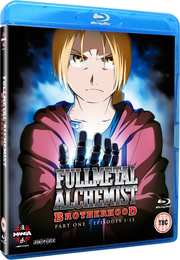
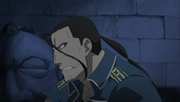
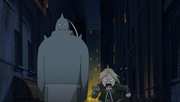

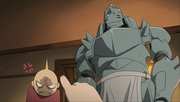
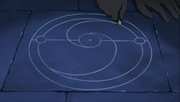
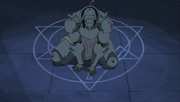
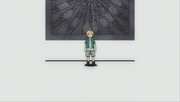


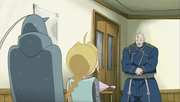



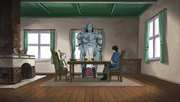



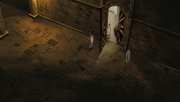
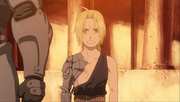



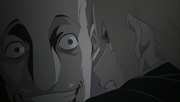



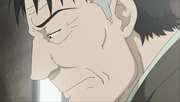
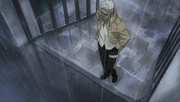


















































Your Opinions and Comments
Be the first to post a comment!